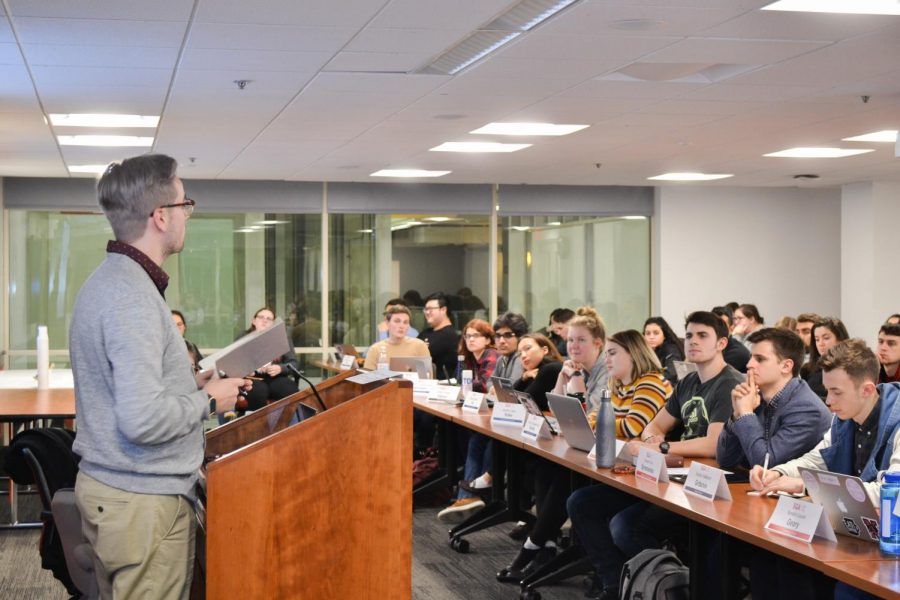SGA updates policy to better evaluate referenda
Student Government Association President Dylan Balcom addresses the Senate in a meeting Feb. 4.
February 20, 2019
The Student Government Association, or SGA, announced on Feb. 14 changes to their policy for referendum submissions to adhere to campus, local and state laws in addition to adding criteria to better evaluate and prioritize referenda.
Under the new policy, the executive cabinet of the SGA will convene to vet the referendum proposals and publish the meeting minutes within 48 hours. In addition, sponsors behind vetoed referenda will receive a detailed rationale highlighting the broken guidelines within 48 hours of the meeting.
SGA also moved the submission deadline from Feb. 18 to March 11, but did not alter the overall timeline of the vetting process. The submission form for proposed referenda was posted Feb. 10, and the original deadline was pushed back as SGA bylines state the referenda submission form needs to be posted a month before the deadline.
“For a long time, there has been a conversation between the student government and the administration at Northeastern about trying to progress the referendum process to make it something that they will see more value in,” said SGA President Dylan Balcom, a third-year behavioral neuroscience major. “So when I got back this semester, we kind of hit the ground running and started drafting and communicating with the administration on what would be a fair referendum process.”
SGA referenda allow the student body to vote directly on a question. The SGA historically has received five referenda per legislative cycle. During last year’s cycle, however, SGA President Dylan Balcom said they experienced a “large influx” of referendum submissions.
The change in the referendum vetting policy and delay of the timeline is to accommodate a growing number of sponsors as well as to promote transparency and objectivity of the vetting process while increasing the urgency of referenda to the administration.
Jake Margolin, a fourth-year philosophy, politics and economics major who is on the executive board of the Roosevelt Institute at NU, praised the change.
“Roosevelt members are very happy to see a full month for students to prepare and propose these referenda,” Margolin said. “We think that more time will lead to better referenda submissions. We thank the SGA administration for fixing it.”
The Roosevelt Institute plans to propose a referendum to implement training for the prevention of sexual harassment and assault on campus, and resources for survivors.
Matt Lowe, a second-year computer science and business administration major and president of the NU College Republicans, said the club has submitted a referendum every year and that the rationale behind the vetting process has not always been clear.
“Essentially, all our referendums should pass every year — that’s not the way it always works out, but that is the idea behind it,” Lowe said. “So this year we are doing the same thing. Get something out there, and hopefully, we’ll enact change on campus.”
A larger-than-normal amount of referenda in 2018 made it hard for the university to prioritize one over another. The SGA legislation that enacted these changes includes, “There was an excess of referenda submitted to Senate in 2018 … If there are no changes made to the referenda procedures, the results may not be considered valid by the University Administration.”
Balcom said the changes are meant to be a “prioritization mechanism,” and that the university raised concerns about the increased volume of referenda.
With the implementation of the new policies, club sponsors will be able to see the reasoning behind vetoes. Lowe also praised the postponement of the deadline.
“[Submitting referenda] are important to our club. So that’s great to see that they pushed [the deadline] back, that they’re willing to show that they’re just willing to work with clubs on campus,” Lowe said.
Balcom said he hopes that the policy change will accommodate the increasing number of referenda and improve relations between the sponsors, student government and administration.
“We just want to have that open conversation,” Balcom said. “So that way, we know what the people’s aims are, what they are hoping to gain … it will make a better referendum if the student body and the student government are on the same page.”
Correction: An earlier version of this story mistakenly listed the reasoning for the referenda submission deadline extension and its date. The extension was done to comply with SGA BYLAWS and the date is March 11.


















